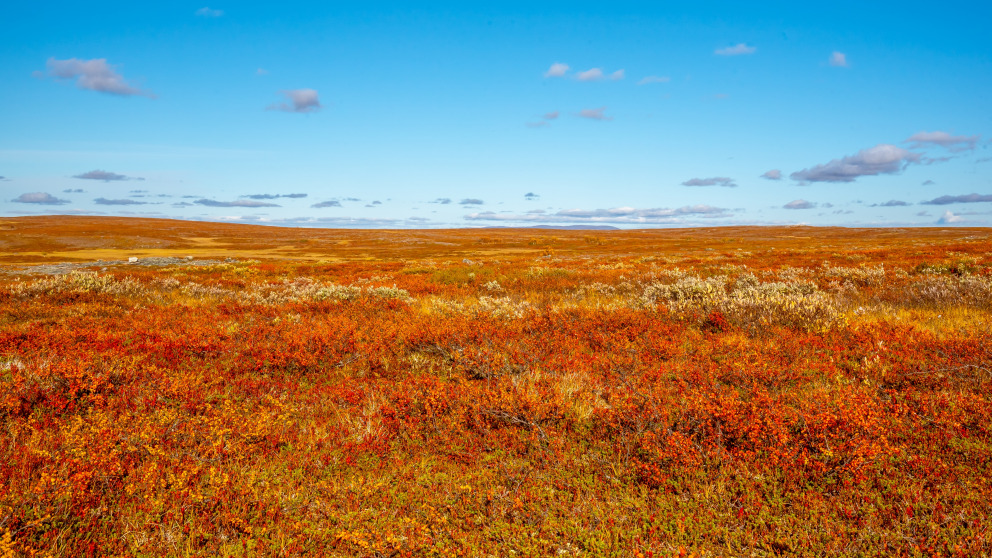DÁVGI: Bridging Academic and Indigenous Knowledge
18.11.2022

In Autumn 2020, a group of researchers came together around the shared aim of establishing a platform for just knowledge exchange and co-creation in the Arctic. Together, they wrote a proposal and letters of support that secured a grant from the European Environment Initiative (EURENI) that would enable the network to extend their capacity to develop innovative co-creative methods and collaborate effectively. The project was named DÁVGI, the Sámi word for ‘bow’. This name was chosen to represent the group’s aim of bridging academic and Indigenous knowledge by empowering both for the benefit of biocultural diversity in the Arctic.
DÁVGI aims to provide a basis for the exchange of knowledge and expertise to improve collaboration between Indigenous rights holders, environmental and other non-governmental organizations, local stakeholders, researchers, and policymakers in order to strengthen the conservation and restoration of biocultural diversity in the Arctic. This will be achieved at three levels:
- Establishment of a network consisting of environmental and other non-governmental organizations, institutions, universities, and Indigenous rights organizations in Europe, as a foundation for improved collaborative practice and knowledge exchange.
- Co-organization of workshops and an international conference. Based on these activities, academic publications, presentations, guidelines, and other forms of output will be co-created with the aim of generating and sharing knowledge widely.
- Creation of a platform for knowledge exchange with Arctic communities in order to enable deeper reflection and mutual learning on the needs and possibilities for improved collaboration.
The project is led jointly by the Saami Council, IASS, and Ecologic Institute. Administrative coordination capacities are provided by the IASS.
The Official Launch
DÁVGI officially launched on October 26, 2022. The DÁVGI team was pleased to welcome Anne Miehe of the Federal Ministry for the Environment, Nature Conservation, Nuclear Safety and Consumer Protection (BMUV) to the IASS in Potsdam, as well as Anja Márjá Keskitalo (Saami Council), Paul Karnatz and Adrian Guhr (Zukunft – Umwelt – Gestaltung [ZUG] gGmbH), who attended online. Mark Lawrence (Managing Scientific Director of the IASS) also attended the kick-off meeting.The meeting began with an impactful presentation by Anja Márjá Keskitalo (Saami Council), who provided a glimpse into past traumatic experiences of Saami peoples with non-Indigenous researchers and present unbalanced relationships, highlighting the importance of the DÁVGI project today. Arne Riedel (Ecologic Institute) provided an overview of the project’s concept and work to-date. Nina Döring (IASS) explained the next steps in the project, including the first workshop starting later that day.
The First Methods Workshop
The first DÁVGI methods workshop took place over three days immediately following the kick-off meeting. The workshop drew on themes that emerged in previous group-wide discussions, such as why and how the group works together, different perspectives on co-creation, and the possibility of co-developing an online platform that could support the network. The purpose of this initial workshop was to think about ways to co-create and start doing the legwork for a follow-up reflection workshop to be held in Vienna in early 2023, which will be about the future of this research network and co-creative methods more broadly. The development of a concept for a future website was a particular focus of the workshop in October, where participants created a mock-up on paper as a means to sketch out a practical work plan and approach for the period leading up to the next workshop.
In the first “paper prototyping” activity, participants worked in pairs to imagine a website and construct the format and content using paper, pens and post-it notes. This exercise sparked ideas about online structures, elements, design and content, and generated questions about our network. Members of the network who could not visit Potsdam in-person shared their ideas in an online meeting.
Next, workshop participants re-grouped to share ideas and sort them into categories: website elements (i.e., things that should be on the website), design (i.e., how the website should look and function), discrepancies (i.e., ideas and desires that seem to conflict), and questions (about the website and research network). These categories helped piece together a pathway to the upcoming 2023 workshop. This included practical tasks, such as workshop themes and materials to be developed, as well as process considerations, like how to involve the whole research network, while minimizing members’ workloads.
DÁVGI will deliver outcomes that go beyond the tangible. This first methods workshop started with abstract websites and ended with a pathway to the next methods workshop and ideas on how to work well together as a network. Every aspect of the workshops and all DÁVGI activities – from planning to implementation – aim for inclusive and respectful co-creation.
